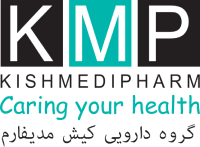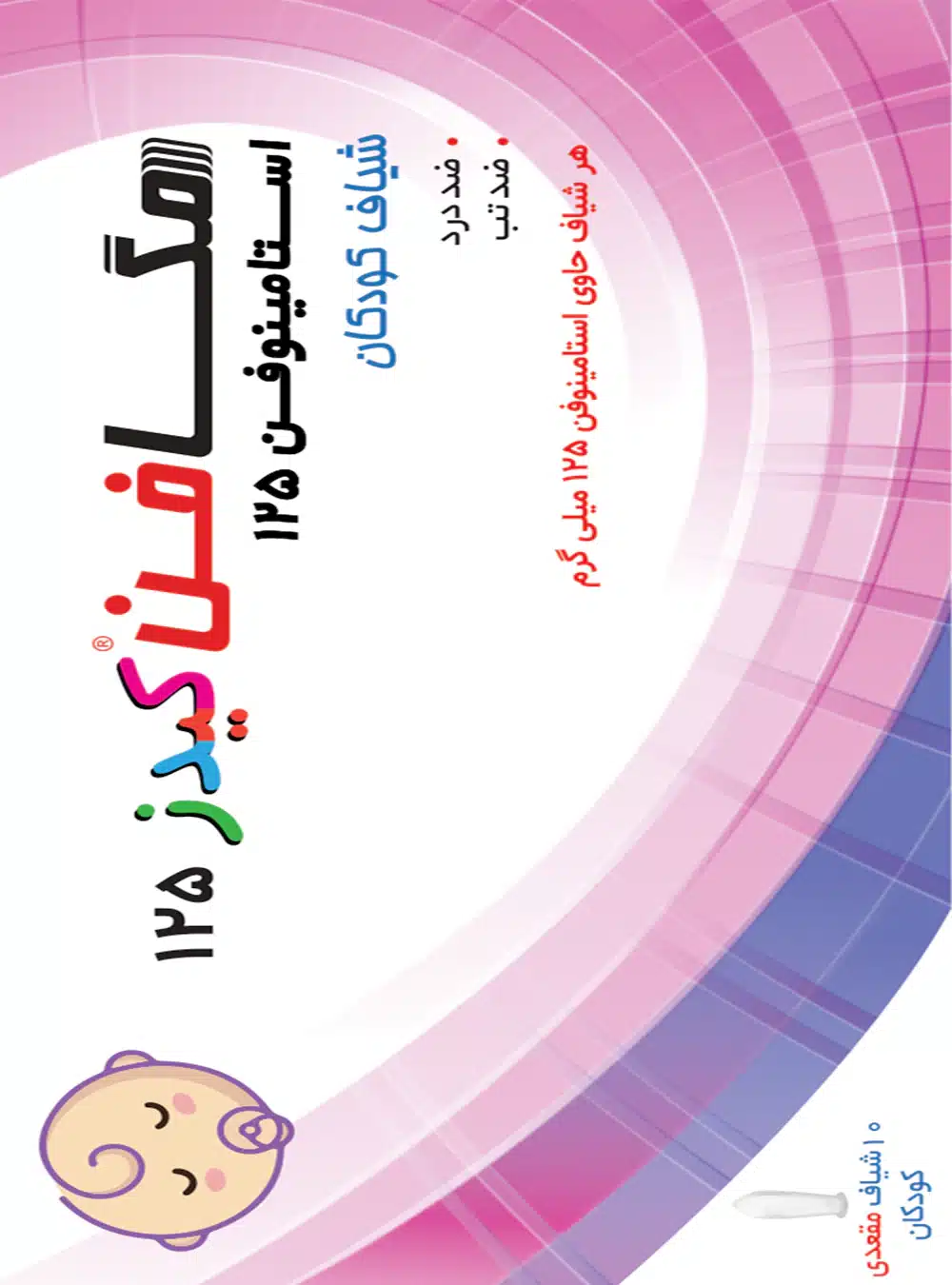Description
Megafen Kids Acetaminophen Suppository 125 mg is one of the suitable dosage forms for children, especially when oral administration of the drug is not possible. This drug is used as an antipyretic and mild to moderate analgesic, and by inhibiting certain enzymes in the brain and spinal cord, it controls the transmission of pain signals and also regulates body temperature.
Uses of Megafen 125 mg children's acetaminophen suppositories
Since children's digestive systems may be sensitive to oral medications, acetaminophen suppositories are absorbed through the rectal route and have a faster therapeutic effect. This medication is effective in controlling fevers caused by viral and bacterial infections, relieving teething pain, headaches, sore throats, and muscle and joint pain in children.
It is also recommended as a safe option after vaccination to prevent the child's body temperature from rising. Parents should consult a doctor before using this medicine and follow the exact dosage according to the child's age and weight. In general, the uses of Acetaminophen 125 suppositories for children are as follows:
- Relief of mild to moderate pain
- Reducing fever caused by a cold or infection
- Teething pain
- Headache and sore throat in children
- Musculoskeletal pain
- Pain and fever after vaccination
Important tips before using Acetaminophen 125 Children's Suppositories
Before using any medication, especially in children, some medical and pharmaceutical considerations should be carefully considered. Megafen Kids Acetaminophen Suppositories are no exception to this rule. Any previous allergies to drug ingredients, history of certain diseases, use of other medications, and specific physiological conditions (such as pregnancy or breastfeeding) should be reviewed and reported to the doctor before prescribing the medication.
In some cases, acetaminophen can interact with other medications or diseases and cause complications. Also, if the child has chronic diseases such as liver or kidney failure, this drug should be used with more caution. Accurate knowledge of the child's health status before starting treatment helps prevent unwanted complications and increase the effectiveness of the drug. Things to inform the doctor:
- The presence of drug allergies or sensitivities in the child
- Being pregnant or breastfeeding
- Taking other medications at the same time
- Having underlying diseases such as liver or kidney failure
Method and dosage of Acetaminophen 125 Megafen Kids suppositories
It is important to take the medicine correctly, especially when it comes to medicines designed for children. Acetaminophen 125 mg Megafen suppositories should be used in full compliance with the recommended dosage based on the child's age, weight, and clinical condition. Taking more than the recommended amount of this medicine can lead to liver toxicity or even death.
It is best for parents to always ask their child's doctor or pharmacist about the appropriate dosage and never prescribe medication based on other people's experiences. The suppository should be inserted into the child's anus with clean hands and in the side-lying position. Also, the time interval between doses of the medication should be at least 4 to 6 hours. In If the medication is needed repeatedly or if there is no adequate response to it, it is necessary to see a doctor again. Dosage of Acetaminophen 125 Megafen Kids Suppository:
- Children under 3 years of age: only with a doctor's prescription.
- 3 to 6 years: 125 mg, every 4 to 6 hours, maximum 5 doses in 24 hours
- 6 to 12 years: 325 mg, every 4 to 6 hours, maximum 5 doses in 24 hours
- Over 12 years: 650 mg, every 4 to 6 hours, maximum 6 doses in 24 hours
- Maximum allowed value:
- Children under 12 years: 5 doses in 24 hours
- Over 12 years: maximum 4000 mg in 24 hours
Contraindications for the use of Acetaminophen 125 suppositories in children
Any drug may be inappropriate or dangerous for a group of patients in certain circumstances. Children's acetaminophen suppositories also have restrictions on use that parents and doctors should be aware of. If a child has a known allergy to acetaminophen, the drug should be completely prohibited. Also, severe liver and kidney diseases, which reduce the body's ability to metabolize and excrete the drug, make the use of acetaminophen a high-risk matter.
Children who suffer from chronic anemia, malnutrition, or general weakness should also use this medication under the supervision of a doctor, as the drug's tolerance is reduced in these conditions. In cases where self-medication continues for a long time without medical supervision, the risk of serious liver complications increases. Parents should avoid self-administration of suppositories for children with active viral infections, as in some cases it may worsen symptoms. In general, contraindications for the use of acetaminophen suppositories for children are the following:
- Allergy to acetaminophen or other drug ingredients
- Severe liver or kidney failure
- History of anemia or chronic anemia
- Chronic alcoholism (in the mother or caregiver)
- Severe or chronic malnutrition
- Self-medication for more than 5 days in children
- Untreated viral infections
Important drug interactions with Megafen Children's Acetaminophen 125 Suppositories
Using different medications at the same time can affect the effectiveness of treatment or cause dangerous side effects. Children's Acetaminophen 125 Suppositories interact with some medications, which is important for parents and caregivers to know.
Drugs that increase liver enzyme activity, such as barbiturates or some anticonvulsants, can speed up the metabolism of acetaminophen and reduce its effectiveness. Also, taking acetaminophen with alcohol or drugs such as isoniazid and phenytoin increases the risk of liver toxicity. Taking blood thinners such as warfarin with acetaminophen may also increase the risk of bleeding. Being aware of these drug interactions and consulting your doctor is key to avoiding dangerous side effects.
- Barbiturates
- Alcohol (ethanol)
- Phenytoin
- Isoniazid
- Sulfinpyrazone
- Warfarin
- Lamotrigine
Possible side effects of Acetaminophen 125 suppositories for children
Any medication can cause side effects, especially if taken in excess or if you have a specific sensitivity. Acetaminophen suppositories, although generally safe and effective, can cause symptoms such as nausea, vomiting, or diarrhea in some children.
In some rare cases, allergic reactions such as hives, skin rash or itching are also observed. The most important complication that should be considered is acute liver failure due to overdose. Other warning signs include decreased urine volume, painful or bloody urine, severe weakness and yellowing of the skin. If any abnormal symptoms are observed, the drug should be discontinued and a doctor should be contacted immediately.
- Rash, hives, itchy skin
- Nausea, vomiting, diarrhea
- Abdominal pain, mouth ulcers
- Dark or bloody urine, burning when urinating
- Severe weakness and fatigue
- Behavioral and brain changes
- Jaundice (yellowing of the skin or eyes)
- Severe liver failure at toxic doses
Acetaminophen use during pregnancy and breastfeeding
Taking medication during pregnancy and breastfeeding requires special caution, as the active ingredients can be transferred to the fetus or infant through the placenta or breast milk. Acetaminophen is one of the few drugs that has been proven to be safe during pregnancy in therapeutic and short-term doses. However, doctors recommend that even this drug be used only when necessary and with a doctor's prescription. During breastfeeding, a small amount of acetaminophen also enters breast milk, but no serious complications in infants have been reported so far. However, its use should be done under the supervision and discretion of a doctor to minimize the possibility of problems.
- Placental transfer has been confirmed.
- Safe in therapeutic doses and short-term use in pregnancy
- Slight secretion in breast milk
- No side effects recorded in the baby
- Use with doctor's prescription in both periods
Important warnings about using children's acetaminophen suppositories
Proper and safe use of acetaminophen suppositories for children requires strict adherence to medical warnings. This medication is not designed for oral use and should only be used rectally. Incorrect oral use may cause gastrointestinal complications or eliminate the effectiveness of the medication. In people with alcoholism, drug metabolism is impaired, and taking more than 2 grams of acetaminophen per day may lead to irreversible liver damage.
Acetaminophen can be fatal in high doses, and overdose should be taken seriously even if there are no early symptoms. Unlike aspirin, it does not affect platelets or blood thinning. It may also affect the results of home blood sugar tests.
- For rectal use only.
- Starts working in minutes
- Permitted dose in alcoholic patients: maximum 2 grams
- Overdose may lead to death.
- Does not affect platelets or blood thinning.
- False positives in home blood sugar testing
Treatment of acetaminophen poisoning in children
In case of acetaminophen overdose, immediate medical attention is required, as liver failure can occur without warning. Early symptoms of poisoning include irritability, nausea, restlessness, excessive sweating, and weakness. As poisoning progresses, more serious symptoms such as hallucinations, slow heart rate, impaired consciousness, and even seizures occur. Initial treatment includes immediate transfer of the patient to medical facilities and administration of a specific antidote (acetaminophen antidote) called “N-acetylcysteine.” Any delay in treatment may be dangerous and fatal. Parents should bring the medication packaging and the dosage to speed up the diagnosis and treatment process. Symptoms of poisoning and initial measures:
- Restlessness, sweating, irritability
- Nausea, vomiting, drowsiness
- Increased blood pressure, decreased alertness
- Hallucinations, seizures, confusion
- Immediate referral to a medical center
- Rapid administration of antidote (NAC)
Storage conditions for Megafen children's acetaminophen suppositories
To maintain the effectiveness of the drug, its storage conditions must be carefully observed. Suppositories are sensitive to heat and light, and storage at temperatures above 30 degrees may cause the drug to melt or change its properties. Direct contact of the drug with sunlight or heat sources should also be avoided. Refrigerating or freezing the suppository should also be avoided, unless specifically advised by the doctor or pharmacist. To maintain the safety of children, the drug should be stored in the original box and out of their reach.
Proper maintenance tips:
- Store at temperatures below 30°C.
- Protect from light, heat and frost.
- Store in the original box.
- Keep out of reach of children.
Acetaminophen suppositories 125 mg Megafen are presented in a cardboard box containing two plastic sheets (blisters). Each sheet contains 5 suppositories, a total of 10 per box. The packaging design is such that it prevents moisture and light from entering the medicine and at the same time allows


Reviews
There are no reviews yet.